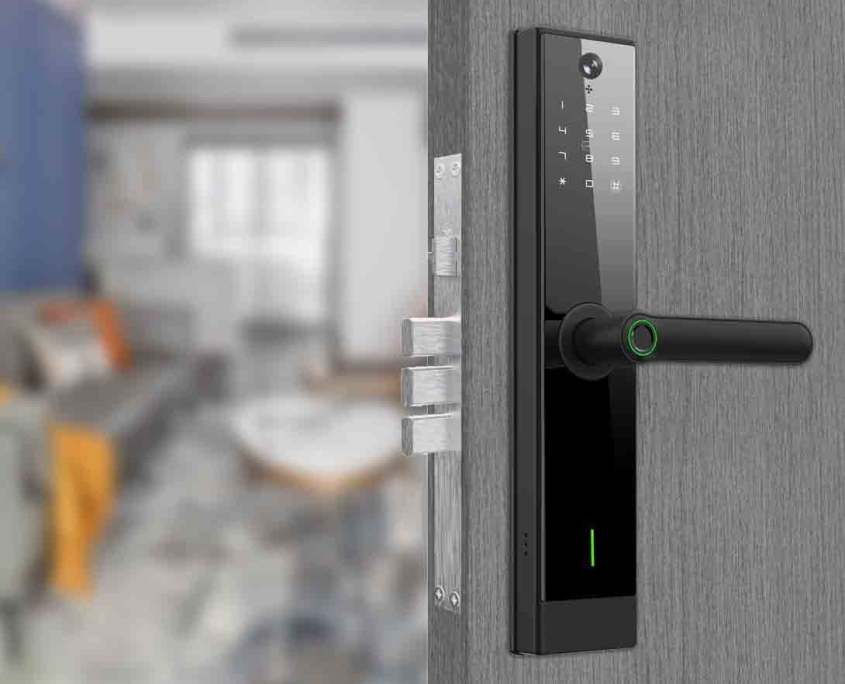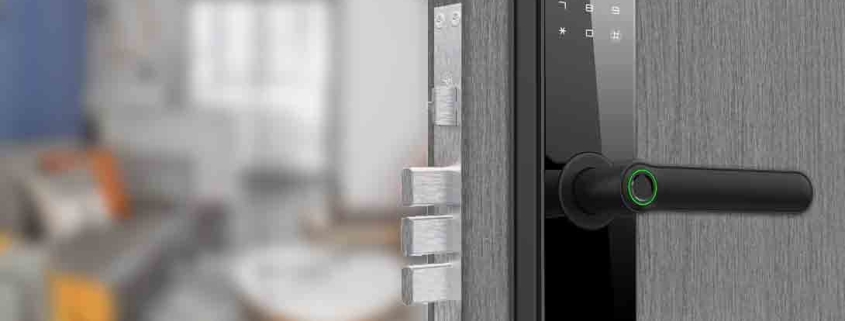What is the difference between digital and smart lock?
In today’s tech-driven world, traditional keys are becoming a thing of the past. More Americans are turning to digital and smart locks for convenience, security, and modern home integration. But what exactly is the difference between a digital lock and a smart lock? While both eliminate the need for physical keys, they serve different purposes and offer varying levels of functionality.
This guide will break down the key distinctions, benefits, and best use cases for each type of lock—helping you decide which is the best fit for your home.
1. What Is a Digital Lock?
A digital lock (also called an electronic lock) is a keyless entry system that uses a numeric keypad, RFID card, fingerprint scanner, or other electronic authentication methods instead of a traditional key.
Key Features of Digital Locks:
-
Keypad Entry: Users enter a PIN code to unlock the door.
-
Battery-Powered: Most digital locks run on AA or lithium batteries.
-
No Wi-Fi/Bluetooth Connectivity: They operate as standalone devices.
-
Manual Control: No remote access or automation features.
-
Common Uses: Apartments, offices, hotel rooms, and residential homes where keyless convenience is desired without smart home integration.
Pros of Digital Locks:
No keys to lose – Eliminates the risk of lockouts.
Easy to install – Many models replace existing deadbolts.
Affordable – Typically cheaper than smart locks.
Reliable – No dependency on internet or power outages.
Cons of Digital Locks:
No remote access – Can’t unlock the door via smartphone.
Limited user management – Harder to track who enters.
Vulnerable to code hacking – Weak PINs can be guessed.
Best For: Homeowners who want keyless convenience without smart home features.
2. What Is a Smart Lock?
A smart lock is an advanced electronic lock that connects to your home’s Wi-Fi, Bluetooth, or a smart hub to enable remote access, automation, and integration with other smart devices.
Key Features of Smart Locks:
-
Smartphone Control: Lock/unlock via an app.
-
Voice Assistant Compatibility: Works with Alexa, Google Assistant, or Siri.
-
Remote Access: Grant temporary access to guests (e.g., cleaners, dog walkers).
-
Activity Logs: Track who enters and exits your home.
-
Auto-Lock/Unlock: Some models lock automatically when you leave.
Pros of Smart Locks:
Remote access – Lock/unlock from anywhere.
Temporary access codes – Great for Airbnb hosts or service workers.
Smart home integration – Works with Alexa, Google Home, and security systems.
Enhanced security alerts – Get notifications if someone tampers with the lock.
Cons of Smart Locks:
More expensive – Higher upfront cost than digital locks.
Dependent on Wi-Fi/power – May malfunction if the internet goes down.
Battery life concerns – Requires periodic battery changes.
Best For: Tech-savvy homeowners who want remote control and smart home automation.

3. Key Differences Between Digital and Smart Locks
While both digital and smart locks eliminate the need for physical keys, they differ significantly in functionality, connectivity, and convenience. Here’s a detailed breakdown of their differences:
1. Keyless Entry
-
Digital Lock: Uses a PIN code, fingerprint, or RFID card for entry.
-
Smart Lock: Offers multiple access methods, including PIN codes, smartphone apps, voice commands, and even biometric scans.
2. Remote Access
-
Digital Lock: No remote control—must be operated manually at the door.
-
Smart Lock: Can be locked/unlocked remotely via a smartphone app, making it ideal for granting access to guests or service providers when you’re not home.
3. Smart Home Integration
-
Digital Lock: Standalone device with no connectivity to other smart systems.
-
Smart Lock: Works with voice assistants (Alexa, Google Assistant, Siri), security cameras, and home automation systems for seamless control.
4. Temporary Access Codes
-
Digital Lock: Cannot generate temporary or guest codes.
-
Smart Lock: Allows creation of time-limited access codes for visitors, cleaners, or Airbnb guests.
5. Activity Logs
-
Digital Lock: Does not track who enters or exits.
-
Smart Lock: Records entry history, letting you monitor who accessed your home and when.
6. Connectivity
-
Digital Lock: No Wi-Fi or Bluetooth—operates independently.
-
Smart Lock: Connects via Wi-Fi, Bluetooth, or smart home hubs (Z-Wave/Zigbee) for remote features.
7. Price
-
Digital Lock: More affordable, typically ranging from 50to200.
-
Smart Lock: More expensive, usually between 150and400+, depending on features.
8. Installation
-
Digital Lock: Generally easy to install, often as a direct replacement for traditional deadbolts.
-
Smart Lock: May require additional setup, such as connecting to a smart home hub or configuring Wi-Fi.
9. Power Source
-
Digital Lock: Runs on batteries (AA or lithium) with no backup connectivity.
-
Smart Lock: Also battery-powered but may include backup options like physical keys or emergency power ports.
4. Which One Should You Choose?
Choose a Digital Lock If You…
-
Want a simple, keyless entry system.
-
Don’t need remote access or smart features.
-
Prefer a budget-friendly, low-maintenance option.
Choose a Smart Lock If You…
-
Want to control your lock remotely.
-
Need to give temporary access to guests.
-
Have a smart home system (like Alexa or Google Home).
-
Value security alerts and activity logs.
Final Thoughts
Both digital and smart locks offer keyless convenience, but smart locks take security and automation to the next level. If you just want to ditch physical keys, a digital lock is a great, low-cost solution. But if you love smart home tech and remote access, a smart lock is worth the investment.
What’s your preference? Are you team digital lock or team smart lock? Let us know in the comments!









